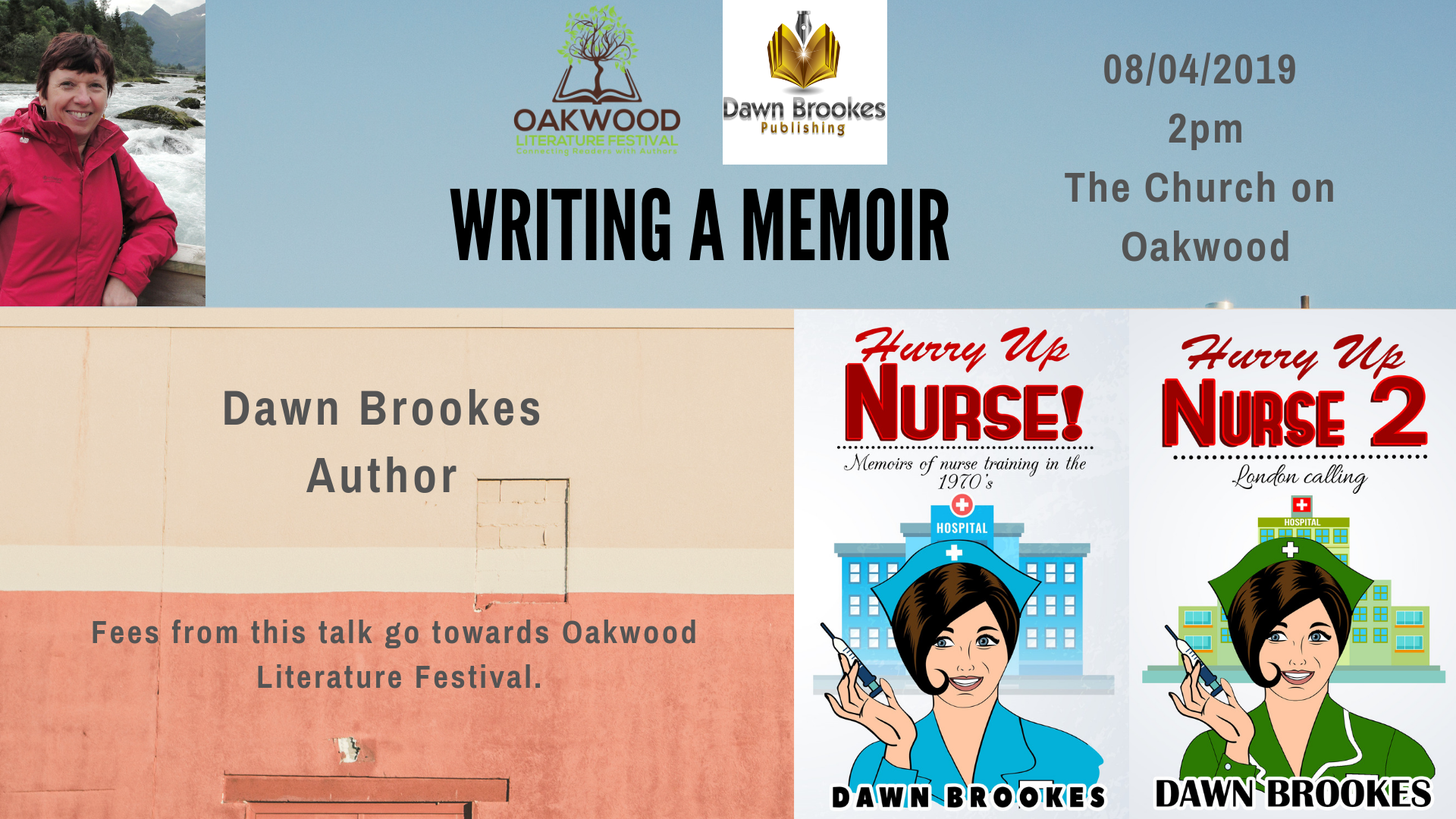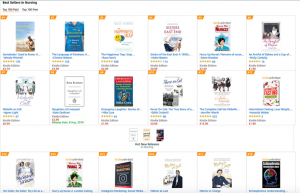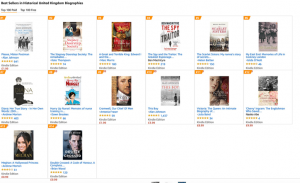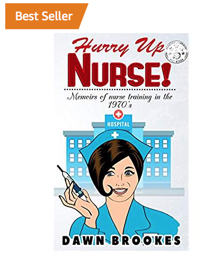By Dawn Brookes, bestselling author of Hurry up Nurse: memoirs of nurse training in the 1970s.
Recently I gave a talk at a local church to an interesting group of people, most of whom could write great memoirs if they had a mind to. We all have a story to tell, so if you’ve ever considered writing your own memoir but don’t know where to start, read on…
Memoir or Autobiography
First of all you need to decide whether their focus is on your whole life story (an autobiography) or on one aspect of your life, bringing in themes, memories and anecdotes that highlight that theme (a memoir). To be honest, unless you’re famous or writing for posterity, a memoir is likely to be more readable that an autobiography! Having said that, who knows?
Reasons for Writing
People have different reasons for writing a memoir or autobiography, some of which are listed below:
- Personal–writing for posterity, family
- As branding –e.g. running a business
- Teach something
- Publishing–writing to publish
You don’t have to be famous, but it helps!

This was a screenshot of the top 17 books listed in the bestseller list of Amazon’s memoir/biography section at the time I prepared my talk. Spot the famous people! That said, there are some who weren’t well-known prior to writing their biography or memoir.
When you niche down, it makes a difference as shown in this screenshot of the bestsellers in nursing category where two of my books feature in the top 18! If I’d taken a screenshot of the US Amazon store, niching down, my book would be top, where it has been for the past 16 months, but hey, that’s just showing off!
My point is, you can do well within your area of expertise if you’re writing a memoir. This only matters if you’re considering publishing of course. When I started writing my first memoir, it was more about getting my memories written down for posterity.
Niches
Here are just a few niches where memoirs are popular, but the list is not exhaustive:
- Career–e.g. Medical/Nursing – think Adam Kay, Jennifer Worth, Monica Dickens; lawyer; teacher; train driving; councillor; vicar, sport etc
- War –WWI; WWII; Gulf wars; Afghanistan etc
- Conflict–Ireland; Spain etc
- Romantic–love story; loved & lost; cross-cultural etc
- Rags to Riches –e.g. Cliff Richard
- Addiction–ex addict; child of addict etc
- Difficult background to happiness, profession, faith etc
- Wealthy background to poverty, mental health issues, addiction etc
- Ordinary but have a story to tell
- Different viewpoint –war from German perspective,
- Religious–missionary etc
- Travel–travel memoir
- Pet stories
- Worked somewhere of national interest or for famous person etc
Even within those niches you can niche down again e.g. historical account. This image from the UK Amazon store shows bestsellers listed under biographical history.
Making it Interesting
People want to engage with an author’s story and the book needs to be worth reading. This is just as true if you are only writing for family, the story still needs to resonate. People are more likely to engage with stories that are gritty; painful, true stories; relatable e.g. medical nursing (most people experience the health sector at some time); about abuse although this might be difficult to write; insider secrets; pet stories. Whatever the theme, if some aspects of the above are included, you are more likely to grab peoples’ attention!
Make it Unique
In one way, there is nothing new under the sun, but in another, your story is unique and you need to bring that originality throughout. Mindmap the memories associated with your story and choose carefully what to include and what not to include. Choose with care how much detail to go into if you’re considering publishing. Initially you will write a whole lot more than you need.
There are some things you need to be cautious of and these include:
- Identifying people
- Venting your anger at an individual or workplace
- Defamation of character
- Glossing over the surface
- Too much detail
- Not enough detail
My memoirs are about my work as a nurse and therefore it was important for me to protect the confidentiality of those involved, particularly patients. In most circumstances, changing a name isn’t enough in such cases so I had to change names, times, places and sometimes, gender in order to protect people from being identifiable. This doesn’t alter the truth of the content and you will need to state that you have done this at the beginning.
This also works if you do need to talk about someone who has hurt you or damaged a work environment if these things are a necessary part of your story.
Some tips you might want to consider:
- Change characteristics e.g. gender, time, place, details
- Get release forms signed if using real names
- Ask friends if they are happy for you to use their names or a pseudonym
- Include disclaimer at the front of the book
- Don’t hide the bad bits but disguise the people responsible
Show don’t Tell
Contemporary fiction writers use a ‘show, don’t tell’ way of telling a story and such skills are just as important when writing a memoir. Take a look at the example below:
Tell:
‘The night sister walked onto the ward and told me to join her for the ward round.’
Show:
‘The loud clopping sound of heels reverberating off the marble floor outside the ward filled me with dread. As the night sister rapidly approached, the knot in my stomach told me it was time for the ward round.’
Likewise, as with writing fiction, a memoir is made more interesting by the inclusion of dialogue; description with good use of adjectives; conflict; tension; anecdotes; emotion and pacing. I read lots of memoirs, biographies and autobiographies and the better ones use all of those elements.
You also need to be real. People like you to be honest, show vulnerability, and personality. If you like humour, use it, include jokes and funny stories. Swearing will put some people off, but if that’s you, it will make the story more real to use your potty mouth. Also build the narrative, adding tension as the story progresses.
Mistakes to Avoid
- Poor structure
- Too much detail
- Being a show-off/arrogant (for some this will work, but for most, it won’t)
- Being superficial
- Missing your topic, theme
- Unrelateable
- Hiding your mistakes (don’t pretend to be perfect)
Tips for Producing Your Memoir
- Introduction
- Sections/chapters relevant to your topic
- Chapters named or numbered
- Keep chapters similar lengths (not always possible but aim to do this)
- Conclusion
- Choose a catchy title
- Get a good book cover (particularly if publishing)
- Get an editor/proofreader (vital, even if self-publishing)
- Word count 40,000 –90,000 words
Conclusion
This short article might give you a start, but is not exhaustive by any means. You never know where it might lead to, I have re-invented myself in my fifties and now write children’s books and cosy mysteries.
If you do decide to write a memoir, autobiography, I’d be interested to hear how it goes for you. Thank you for reading this article.








